- Home
- Cynthia Voigt
Tree by Leaf Page 10
Tree by Leaf Read online
Page 10
Lou nodded her head.
“I’m sure Mr. Hatch would like some hot cocoa, to warm him before he goes back outside,” Mother suggested. She was still standing with the telegram in her hand. Clothilde just sat quiet in her chair, the cloak spread out like a black blanket over her knees. Telegrams carried urgent news, bad news.
“Would you like that, Tom?” Lou asked.
“I’d like it fine,” he said. “I could use a warm drink.”
When they had gone into the kitchen, Mother sat down. She folded her needlework neatly onto the table. She opened the yellow envelope with careful fingers, then pulled out the folded flimsy paper, with the strips of words glued onto it.
Mother took a long time reading. The message was only one line long, as Clothilde could see by staring at the back of the paper. Mother read it.
“It’s from your grandfather,” she said, at last.
“Grandfather? What’s the matter? Why should he send us a telegram? What does it say? Mother, tell me.”
Instead of answering, Mother passed over the paper. Clothilde read: NATHANIEL HAS COME TO LIVE AT HOME PERMANENTLY STOP AGSPEER. She read it again, as if she couldn’t understand what it said. But she understood.
“Nate was lying,” she said to her mother. “It was all a lie, about the cruise, and the friends who wanted him to come, wasn’t it.” She felt too sad to be angry. She never thought Nate would lie to them that way, and it was all somehow her grandfather’s doing. “I hate him,” she said, thinking of Grandfather.
“You musn’t hate your brother,” Mother said. Her hands were back at work, the needle drawing its bright yellow tail behind it, as if nothing had happened.
Clothilde didn’t bother correcting her mother’s mistake. She pushed the cloak off of her lap, letting it fall onto the floor. She got up and went over to pull aside the curtain. Foggy darkness closed around the house. From the kitchen she heard Tom Hatch’s voice, speaking slowly. She thought of how Grandfather had set about his plan to take Nate away from them, by sending him to a fancy school, buying him good clothes, letting him live in the big house in Manfield. Grandfather’s plan had worked and now he had Nate. Ugly, it was an ugly thing Grandfather had done to them. She turned around and looked at her mother’s profile. “It’s ugly,” she said.
“Don’t be so quick to judge what you might not understand, Clothilde,” her mother answered. But she didn’t look up. “You’re only a child.”
Mother didn’t understand at all, but Clothilde didn’t want to explain. She hadn’t thought how her mother must feel about this, how it might feel to have your son go away from home and never want to come back again. Now she thought of that.
“I’m sorry,” she said, meaning sorry that Mother was being made unhappy.
Mother didn’t understand this, either. “I’m glad to hear it, and I hope you’ll strive to do something to correct that habit of judging people. Sit down, dear. You’ve got a task to accomplish. You musn’t be so excitable.”
Clothilde sat down, not because she thought she was being excitable, and not because she wanted to finish her task. She sat down so as not to cross her mother. She picked up the cloak and lay it across her knees again. Her fingers began their patient picking out of the stitches, because that was what Mother wanted.
Poor Mother—Grandfather had always been her enemy and now he’d won Nate over to his side. Clothilde thought of how Nate had looked, telling them about the cruise, lying to them. Grandfather had turned Nate into a liar.
But that wasn’t it. What it was was worse than that. It was so much worse—and it was why she kept hating Grandfather. Because it was Nate who’d turned himself into a liar. Grandfather just tempted him, with the big house and the clothes, with the factory to inherit and the kind of life where you could have all the things you wanted, with going to boarding school. Nate was tempted. What you did when you were tempted was up to you.
“He should have told us,” she said to her mother. “Whatever you say, he should have.”
Mother couldn’t think of any answer to that, and Clothilde was immediately sorry she’d spoken.
“Anyway, he should have toldyou the truth.”
“I’m sure your brother feels unhappy enough about it,” Mother said. “That’s probably why he didn’t tell me. Boys don’t like saying unhappy things. Men don’t. Nate probably didn’t want to hurt my feelings,” Mother explained.
Clothilde opened her mouth to protest, but stopped herself from speaking.
“And I’m relieved—no, that’s true, dear. I didn’t like to think of him out at sea for such a long time. I didn’t want to say anything, but—you never know what might happen. People treat it like a holiday, but a cruise can be dangerous. I’m glad to know he’s somewhere safe,” Mother said.
“Why didn’t you tell him?” Clothilde wondered.
“Oh, he didn’t want me worrying at him. Boys like to have their adventures. It’s part of their growing up. If mothers worry, they should keep that to themselves.”
Clothilde would have asked about that, since Mother seemed to be in the mood to answer questions, but she had just then remembered, once again, her strange dream. She’d gotten one of the things she’d asked for, and she hadn’t even noticed: because Nate wasn’t going away on the cruise. It wasn’t what she’d wanted but it was what she’d asked for.
Clothilde didn’t want her dream to be true. She especially didn’t want it to be true if you got what you asked for in some twisted way. She hoped it was just a peculiar dream. “Mother, remember that story you told us, about the French girl, Joan?”
“Jeanne,” Mother corrected her. “Jeanne d’Arc.” One of the orphanage nuns had been French, so Mother had learned how to read and speak French in their school. Even the aunts had to admit she knew that, when they asked her how to pronounce the name of some fancy dish, or a new fabric.
“That girl heard voices, didn’t she?”
“Yes, you remember. Whatever brought her into your mind?”
“It wasn’t just one voice.”
“No, it was voices. Remember? She was told to lead her people in battle, to free the dauphin and crown him. She did those things, remember?”
Clothilde remembered. She remembered also what had happened to the girl, in the end. “Did anyone ever hear just one voice?”
“What odd thoughts you have, Clothilde. I can’t answer that, dear. My schooling wasn’t complete. You’d have to ask your father something like that.”
“But he—” Again, Clothilde stopped herself; the aunts had often chided Mother because Father hadn’t finished school, as if that were her fault.
“We must hope,” Mother said gently, “that some day he’ll want to come back to live with us.”
“No, I didn’t mean that.” Clothilde didn’t want to talk about that. She didn’t even want to think about the man in the boathouse. “I meant, Grandfather said he was expelled from school.”
“Oh,” Mother said. She looked at Clothilde as if she was deciding something. In the hallway, Lou saw Tom Hatch to the door, but neither of them entered the parlor. “You’d have to know sometime,” Mother said, “but I don’t know that this is the time.”
“Know what? What don’t I know?Mother.” Mother didn’t know what to do, Clothilde could see that. So she tried to make her mother do what she, Clothilde, wanted, by sounding sure. “I ought to know.”
“The truth is, your father was asked to leave school because he was married to me. The students weren’t permitted to be married, that was the rule. But he studied there for almost two years, before, so he learned a great deal. I went to work at fourteen, so I haven’t much schooling.”
Clothilde could barely remember what her question was, she was so surprised at this new information. “I thought you ran away to get married.”
Mother answered quickly. “I had no family. Your grandfather would have tried to stop it, if he’d known. Your father said it would be safer to present him—them—with
the thing already done, so it would be too late for them to do anything to stop us. As things turned out, I think that just made it worse, but how was Father to know that? Your father made an adventure of it. He enjoyed the scheming, thinking how he was tricking your grandfather. But he was surprised, and disappointed, when he was asked to leave the college. He didn’t think they would really do that.”
“But if that was the rule—he must have known the rule.”
“Rules are sometimes changed, for special cases. Rules can be broken, I’m afraid. He hoped they would pretend not to know. It was a foolish hope, but … how was your father to know?”
“So what happened?”
“As you know, we went to live in Grandfather’s house. I didn’t want to hurt your father any more than I already had.”
“How did you hurt him?”
“I shouldn’t have agreed to marry him,” Mother said, as if it was the most sensible thing in the world. “I don’t know how it happened. You see, I thought at first—he was just one of the college boys, the way they flirt and—he was so handsome, and he was always happy—I did say no to him, over and over. But he kept on asking. And I wanted to say yes. Oh—I’ve never wanted anything like I wanted to say yes. So—I finally did. I’m nothing, nobody, and he gave me so much….” Remembering, she looked up and smiled at Clothilde, but not really seeing her, as if she was looking at somebody who wasn’t there. “He came courting me—me—with his hands full of candy and flowers, he made me laugh and he offered me his heart. I gave him a son, I did do that. And maybe your grandfather will be satisfied now.”
“What do you mean?” Clothilde demanded. “You mean, now he has Nate?”
“Mr. Speer blamed me, for taking Father away from them. They all blamed me, as if I’d enchanted him.”
“But you didn’t. You couldn’t help it if he wanted to marry you.”
“I tried, tried as hard as I could, to be the kind of girl he should have married, the kind they wanted him to marry. I only wanted him to be happy. I tried not to make him sorry he’d married me, but I’m afraid he was sorry. He couldn’t help it.”
“Great-Aunt Clothilde must have liked you.” Clothilde wanted that to be true.
Mother smiled, but it was the kind of smile grown-ups wear when children just don’t know. “She never even noticed me.”
Mother wasn’t even looking at Clothilde; she wasn’t even thinking about her. “I was certain he’d die when he—went away. I didn’t want him to die, and I prayed he wouldn’t, but I thought he would. I knew—I shouldn’t have flirted with him the way I did, but I never dreamed he was more than one of the college boys. Flirting can be dangerous,” Mother warned. “You don’t ever want to become a flirt, Clothilde.”
“Yes, Mother,” Clothilde answered, since her mother was waiting for an answer.
“And now, now I’m afraid he wishes that he had died. Over there. Before he went, he was sorry he’d married me. And now, he’s….”
“Like a monster,” Clothilde finished the sentence.
“You musn’t say that,” Mother told her. And why not, Clothilde wondered silently, since it was true. “You should be more merciful, Clothilde, in your thoughts. You go right upstairs, right now, go to bed, and pray for more mercy in your heart.”
Clothilde didn’t know why Mother was so cross at her, and she couldn’t make sense out of their conversation, as if Mother didn’t know what she was saying half of the time, and didn’t know what she meant the other half. On the other hand, Clothilde was glad to be sent upstairs. She wanted to be alone.
In bed, with the blankets over her and the lamp out, Clothilde tried to reassure herself. People heard voices, not one single voice. Probably, Lou’s father would turn up tomorrow or the next day, mean from drinking. She hoped he would. She was angry and sorry that Nate had run away to Grandfather’s house, but she couldn’t be blamed for that; and it wasn’t possible for the man in the boathouse to have his face mended, because that would be a miracle. She didn’t want to be responsible for all the things that were happening, and it wasn’t possible that she was: She just wasn’t that important.
Her mind went around in circles. She stopped its spinning by concentrating on the sound of the slow rain, dripping onto the roof over her head. She thought of Tom Hatch, his kindness in coming out to tell Lou what news there was, and the rain plopped lazily down. Then she thought of Jeb Twohey, and what he’d said about things that grew up and things that grew down. She could bet that Jeb Twohey liked the rain. She thought, her mind drifting now, toward sleep that Jeb Twohey probably felt safer with plants than with people, and she didn’t blame him one bit. She felt that way herself, she thought, falling asleep between the fall of one raindrop and the next.
Chapter 10
Early Tuesday morning, her stomach full with warm oatmeal, Clothilde went to work on the vegetable garden. Wearing an old stained apron over a skirt that was full of its own old stains, she crouched down beside the young chard plants. Her hands, fingers working deep into the water-loosened soil, were eager and full of hope. She didn’t understand it, but her heart was full of hope.
The morning was like a spring morning, warm with promises. Nate had not, as it turned out, gone off on his cruise. So that, it might be that the man in the boathouse—
Clothilde wanted to go over there, to see if maybe…. She didn’t even know what she wanted to be true, but she remembered the way Father would build towers out of blocks, when she was little, and how he would laugh with her when she kicked them down. She let herself remember how once, after the hunt, Mother lifted her up high and Father reached down to carry her up higher, seating her close in front of him on Bucephalus. She rode there all the way down to the stables. She could feel her father’s smile all the way, like sunlight coming from behind. He had put the reins into her hands and wrapped his own hands around hers to hold them steady. He had shown her how to run the reins over her two middle fingers. “Gentle and firm,” he had said, “that’s the way, Clothilde.” Remembering, Clothilde missed her father, with a sad longing feeling like the deep sea.Oh, she thought, her fingers clearing the space around a young plant.Oh, she hoped.
Dampness from the ground seeped gradually through her apron and skirt to her knees. The air swept gently around her, full of the smells of the rain-soaked ground. She finished the row of chard and moved over to the bush beans. Overhead the sky was covered by fat gray clouds, moving patiently along. When Mother called to her from the kitchen door, Clothilde was almost sorry to cease working. But she obeyed the call, content to be obedient.
Mother had made the creamed chicken. While Lou scrubbed the wooden floor upstairs, Mother had stripped the poached fowl of its meat, then cut the meat into big chunks. She had made a light creamy sauce, the aroma of which was still in the air, creamy and buttery, with a faint smell of sweet nutmeg. She held out a dish filled with fresh-boiled white rice and thick creamed chicken. “I want you to take this over to the boathouse, dear,” Mother said, covering the dish with a cloth.
Mother had covered her dress with an apron while she cooked, but now she took the apron off and washed her hands at the sink, as if trying to wash away any signs of cooking.
Clothilde held the bowl in her two hands. “Why don’t you take it?” she asked.
“He doesn’t like to see me. He probably won’t be there. He won’t ask you in.”
“But—” Clothilde said. One look at Mother’s face stopped her words in her throat.
“I don’t want to hear any more from you, young lady.”
But that wasn’t what Clothilde had been going to say. She had been going to ask, didn’t mother want the chance to give this to him. If Mother wasn’t interested to know what Clothilde was really going to say, then Clothilde wasn’t going to argue. She did want to be the one to go to the boathouse, and maybe the one to bring him back home because he had been made better.
“Yes, Mother,”’ she said.
“You needn’t worry. He does
n’t try to talk.”
“But you said—you told us he told you we had to save money. How could he tell you that if he doesn’t talk?”
“That time—then—he didn’t allow me to come in. I was standing outside. You’re becoming a quarrelsome person, Clothilde,” Mother said. “I don’t have the time or patience for this quarreling.”
“Yes, Mother,” Clothilde said.
“And I don’t care for that tone of voice, Clothilde,” Mother said. “I’d like to hear you speak more respectfully.”
Clothilde nodded her head, but didn’t trust herself to speak. It wasn’t disrespect that had been in her voice, it was puzzlement. She thought of Mother dressing up fine in hat and gloves to walk over to the boathouse. She wondered why Mother had done that, if the man wasn’t going to be there. She wondered why Mother kept thinking she knew what Clothilde was thinking when she didn’t have any idea. She wondered why Mother didn’t know that it wasn’t that the man didn’t want to see her, all prettied up, but that he didn’t want her to see him, the way he looked.
Clothilde washed her hands, picked up the covered dish, and went on her way. Cutting straight across the peninsula, she made her approach along the broad, once-graveled driveway, between the tall spruce trees where Great-Aunt Clothilde’s high-wheeled carriages had once rolled. Because of carrying the bowl, she had to keep her feet moving slowly, but her thoughts ran on ahead.
The ruins of the burned cottage were at the top of a slow rise of land. She barely had time to see them before she turned down the slope, along an overgrown path. The boathouse had been built out on the rocks beyond what had once been a lawn. The boathouse had never been intended to hold boats of any size. It was one room, she knew, from peeking in through its grimy windows, where dinghies and oars and sails could be stored. Its shingles had never been stained, so they had weathered to a gray as soft as the clouds overhead. When she had been there before, exploring the peninsula, if it were being torn apart by weather. You could almost see the stages by which it would eventually collapse into a huddle of boards and shingles on the broad rocks. The steps that led from the little building across the rocks and down to deep water were askew, most loosened, some of them hanging down. The railing, she remembered, had been as rickety as it looked—the kind of railing that was more dangerous than no railing, because you were tempted to rest your hand and your faith on it. Clothilde followed the path down to the boathouse, wondering what it would look like, now it was inhabited.

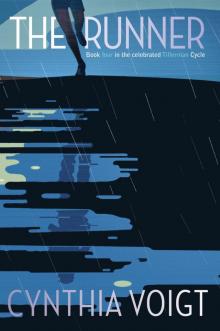 The Runner
The Runner By Any Name
By Any Name Bad Girls, Bad Girls, Whatcha Gonna Do?
Bad Girls, Bad Girls, Whatcha Gonna Do?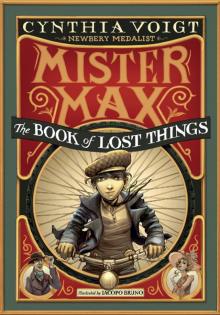 Mister Max: The Book of Lost Things: Mister Max 1
Mister Max: The Book of Lost Things: Mister Max 1 The Wings of a Falcon
The Wings of a Falcon Bad Girls in Love
Bad Girls in Love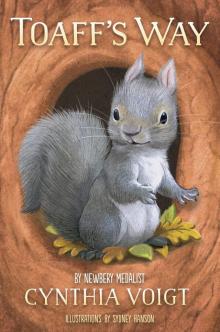 Toaff's Way
Toaff's Way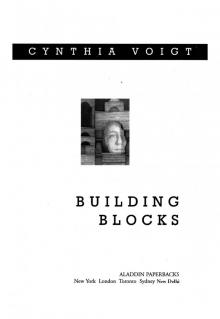 Building Blocks
Building Blocks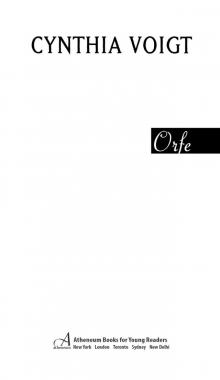 Orfe
Orfe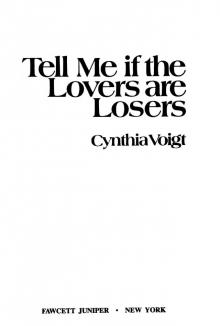 Tell Me if the Lovers Are Losers
Tell Me if the Lovers Are Losers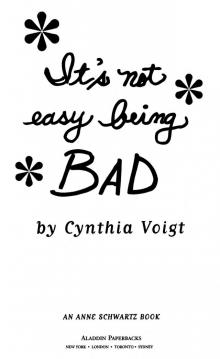 It's Not Easy Being Bad
It's Not Easy Being Bad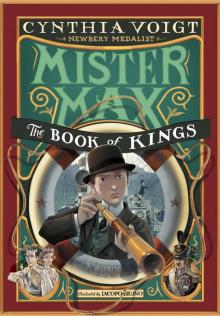 The Book of Kings
The Book of Kings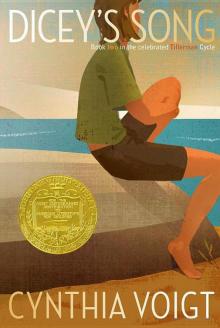 Dicey's Song
Dicey's Song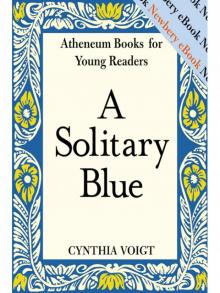 A Solitary Blue
A Solitary Blue Tree by Leaf
Tree by Leaf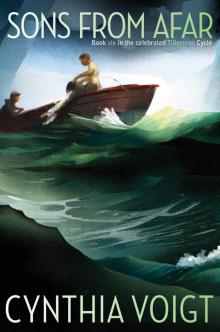 Sons From Afar
Sons From Afar Teddy & Co.
Teddy & Co. Jackaroo
Jackaroo Elske
Elske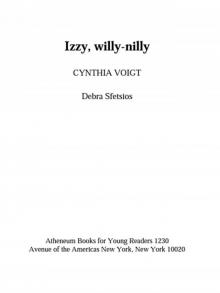 Izzy, Willy-Nilly
Izzy, Willy-Nilly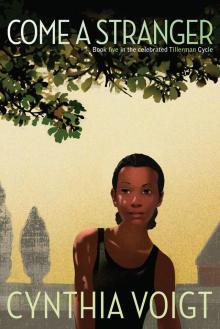 Come a Stranger
Come a Stranger Mister Max: The Book of Secrets: Mister Max 2
Mister Max: The Book of Secrets: Mister Max 2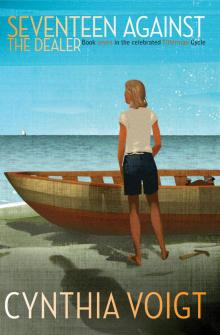 Seventeen Against the Dealer
Seventeen Against the Dealer The Callender Papers
The Callender Papers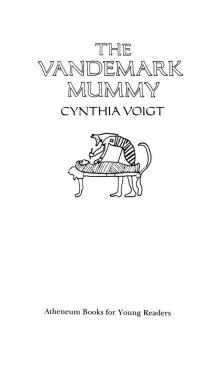 The Vandemark Mummy
The Vandemark Mummy Tale of Birle
Tale of Birle Glass Mountain
Glass Mountain The Tale of Oriel
The Tale of Oriel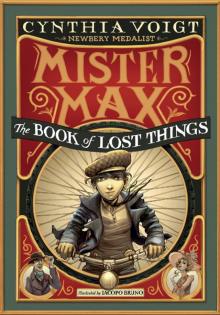 The Book of Lost Things
The Book of Lost Things The Book of Secrets
The Book of Secrets Tale of Gwyn
Tale of Gwyn